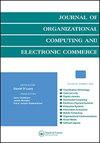A hybrid approach for generating reputation based on opinions fusion and sentiment analysis
IF 1.9
4区 管理学
Q3 COMPUTER SCIENCE, INFORMATION SYSTEMS
Journal of Organizational Computing and Electronic Commerce
Pub Date : 2019-08-29
DOI:10.1080/10919392.2019.1654350
引用次数: 16
Abstract
ABSTRACT Amazon, eBay, IMDb as well as several websites provide a convenient platform where users share their opinions on any entities without hindrance. Though those opinions are too many to be examined one by one, this is why a general reputation value will help people make a decision toward a target entity (purchase, download, rent …). This fact makes reputation generation task very challenging because an inaccurate reputation system will directly damage the credibility and popularity of the target entity. This paper aims to improve a recent work that handles the task of generating reputation based on fuzing and mining opinions expressed in natural languages and user feedback ratings. Therefore, we have proposed a hybrid approach that, (i) separates reviews into positive and negative based on their sentiment polarity by applying the two classifiers Naïve Bayes and Linear Support Vector Machine (LSVM), (ii) groups positive and negative reviews into principal opinion sets based on their semantic relations, (iii) calculates a custom reputation value separately for positive and negative groups by considering some statistics of principal opinion sets and finally (iv) computes the final reputation value using Weighted Arithmetic Mean. Experimental results show a significant improvement with respect to recent work.基于意见融合和情感分析的声誉生成混合方法
Amazon, eBay, IMDb等网站提供了一个方便的平台,用户可以不受阻碍地分享对任何实体的意见。虽然这些意见太多了,无法一一分析,但这就是为什么一般的声誉价值可以帮助人们对目标实体做出决定(购买、下载、租赁……)。这一事实使得声誉生成任务非常具有挑战性,因为不准确的声誉系统将直接损害目标实体的可信度和知名度。本文旨在改进最近的一项工作,该工作处理基于融合和挖掘以自然语言表达的意见和用户反馈评级来生成声誉的任务。因此,我们提出了一种混合方法,(i)通过应用Naïve贝叶斯和线性支持向量机(LSVM)两个分类器,根据评论的情绪极性将评论分为正面和负面,(ii)根据其语义关系将正面和负面评论分组为主要意见集。(iii)通过考虑主要意见集的一些统计数据,分别计算正面和负面组的自定义声誉值;最后(iv)使用加权算术平均值计算最终声誉值。实验结果表明,与最近的工作相比,有了显著的改进。
本文章由计算机程序翻译,如有差异,请以英文原文为准。
求助全文
约1分钟内获得全文
求助全文
来源期刊

Journal of Organizational Computing and Electronic Commerce
工程技术-计算机:跨学科应用
CiteScore
5.80
自引率
17.20%
发文量
7
审稿时长
>12 weeks
期刊介绍:
The aim of the Journal of Organizational Computing and Electronic Commerce (JOCEC) is to publish quality, fresh, and innovative work that will make a difference for future research and practice rather than focusing on well-established research areas.
JOCEC publishes original research that explores the relationships between computer/communication technology and the design, operations, and performance of organizations. This includes implications of the technologies for organizational structure and dynamics, technological advances to keep pace with changes of organizations and their environments, emerging technological possibilities for improving organizational performance, and the many facets of electronic business.
Theoretical, experimental, survey, and design science research are all welcome and might look at:
• E-commerce
• Collaborative commerce
• Interorganizational systems
• Enterprise systems
• Supply chain technologies
• Computer-supported cooperative work
• Computer-aided coordination
• Economics of organizational computing
• Technologies for organizational learning
• Behavioral aspects of organizational computing.
 求助内容:
求助内容: 应助结果提醒方式:
应助结果提醒方式:


